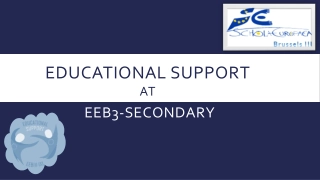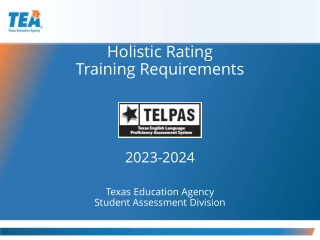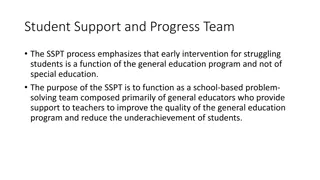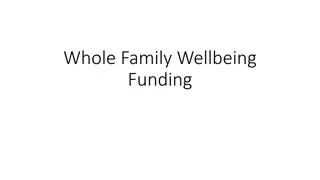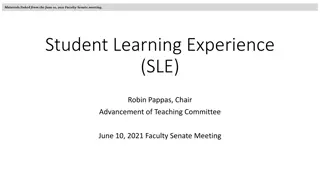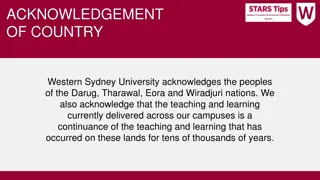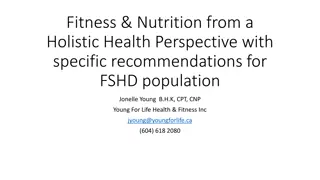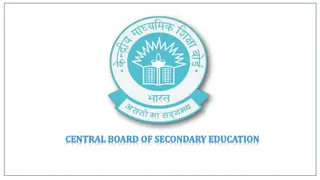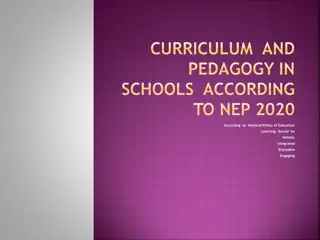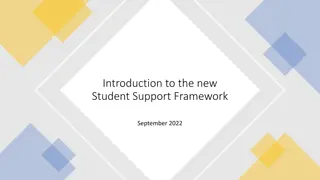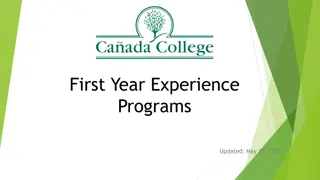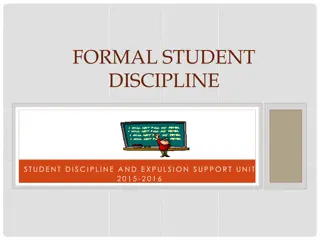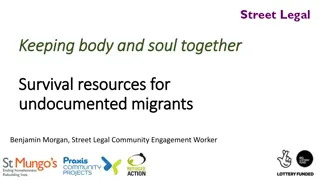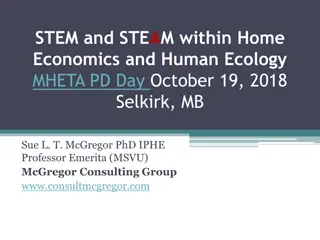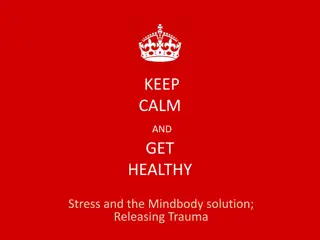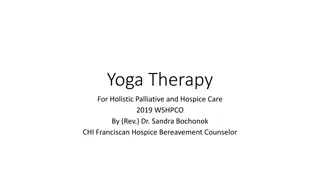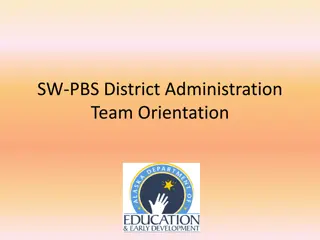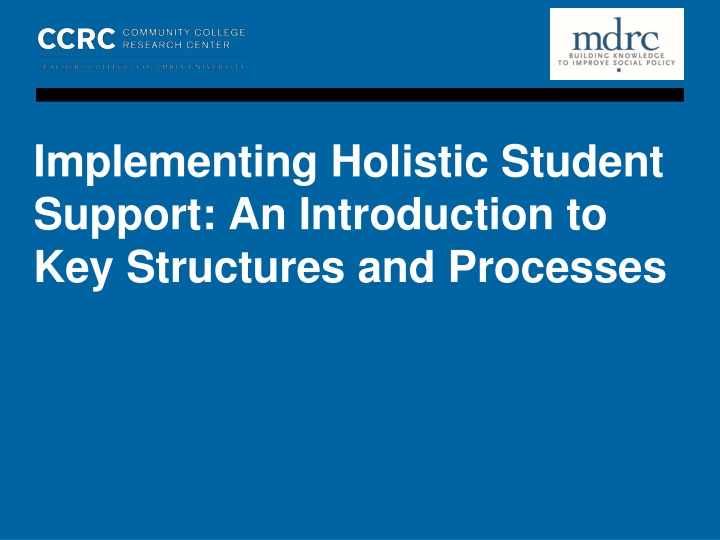
Implementing Holistic Student Support: A Comprehensive Overview
Explore the implementation of holistic student support, encompassing key structures and processes such as advising, cognitive development, and affective support. Discover how this approach guides students in achieving their academic and life goals through a SSIPP model, leveraging technology tools and personalized services to enhance the learning experience.
Download Presentation

Please find below an Image/Link to download the presentation.
The content on the website is provided AS IS for your information and personal use only. It may not be sold, licensed, or shared on other websites without obtaining consent from the author. If you encounter any issues during the download, it is possible that the publisher has removed the file from their server.
You are allowed to download the files provided on this website for personal or commercial use, subject to the condition that they are used lawfully. All files are the property of their respective owners.
The content on the website is provided AS IS for your information and personal use only. It may not be sold, licensed, or shared on other websites without obtaining consent from the author.
E N D
Presentation Transcript
COMMUNITY COLLEGE RESEARCH CENTER / MDRC IMPLEMENTING HOLISTIC STUDENT SUPPORT Implementing Holistic Student Support: An Introduction to Key Structures and Processes 1
COMMUNITY COLLEGE RESEARCH CENTER / MDRC IMPLEMENTING HOLISTIC STUDENT SUPPORT What is holistic student support? 2
COMMUNITY COLLEGE RESEARCH CENTER / MDRC IMPLEMENTING HOLISTIC STUDENT SUPPORT Holistic student support teaches students how to identify and pursue academic and life goals. To teach students how to make these decisions, advising and support practices need to address four areas of learning and development. Information Skills Cognitive Development Affective Support Martin, H. (2007). Constructing learning objectives for academic advising. Retrieved from NACADA Clearinghouse of Academic Advising Resources website: http://www.nacada.ksu.edu/Resources/Clearinghouse/View-Articles/Constructing-student-learning-outcomes.aspx 3 Tait, A. (2000). Planning student support for open and distance learning. Open Learning, 15(3), 287 299.
COMMUNITY COLLEGE RESEARCH CENTER / MDRC IMPLEMENTING HOLISTIC STUDENT SUPPORT Holistic student support is also structured and delivered according to a SSIPP model. Sustained Support is ongoing, rather than using an inoculation approach. Strategic Services are differentiated to maximize capacity. Integrated Services are not viewed as stand-alone interventions. Proactive Services are an integral part of all students experiences. Personalized Students receive the support they need when they need it, from an individual who knows them well. 4
COMMUNITY COLLEGE RESEARCH CENTER / MDRC IMPLEMENTING HOLISTIC STUDENT SUPPORT Holistic support leverages advising technology tools to transform support using SSIPP strategies. Visit tutor Multiple absences Attend office hours Degree Education Career Financial aid issue Submit schedule + + Course Course Finance Coaching & Advising Early Alerts & Risk Targeting Degree Planning 5
COMMUNITY COLLEGE RESEARCH CENTER / MDRC IMPLEMENTING HOLISTIC STUDENT SUPPORT How is holistic student support implemented? 6
COMMUNITY COLLEGE RESEARCH CENTER / MDRC IMPLEMENTING HOLISTIC STUDENT SUPPORT Framework articulates components that embody advising-as-teaching and SSIPP principles. Structures for Student Support Practices Outreach Processes Advising Pedagogy Provides guidance on how and when support is administered so that it is sustained, strategic, and proactive. Outlines communication practices that extend to targeted, personalized messages and address the four areas of learning (information, skills, cognitive development, and affective support). Describes day-to-day interactions between advisors and advisees to teach students in the four areas of learning. Framework is designed to allow institutions to identify and implement the features that align with their institutional context and needs. 7
COMMUNITY COLLEGE RESEARCH CENTER / MDRC IMPLEMENTING HOLISTIC STUDENT SUPPORT Structures for Student Support Practices Administrative Support Guidelines for notifying students of administrative or clerical information. Guidelines for identifying students who have not completed administrative tasks. Guidelines for intervening with students who have not completed administrative tasks. 8
COMMUNITY COLLEGE RESEARCH CENTER / MDRC IMPLEMENTING HOLISTIC STUDENT SUPPORT Structures for Student Support Practices Education Planning Guidelines for helping students create a multisemester degree plan. Guidelines for ensuring that all students have a complete degree plan. Guidelines for intervening with students who do not have a complete degree plan or who make substantive changes to their degree plan without advisor support. Guidelines for checking in with students to ensure that their degree plan still aligns with their academic and career aspirations. Guidelines for monitoring students progress toward completion of program requirements. 9
COMMUNITY COLLEGE RESEARCH CENTER / MDRC IMPLEMENTING HOLISTIC STUDENT SUPPORT Structures for Student Support Practices Student Analytics Risk Identification Guidelines for determining which students are considered at- risk and why. Guidelines for checking early-alert notifications to see which students are at-risk. Guidelines for providing actionable predictive analytic data to advisors or other support service staff. Guidelines for using predictive analytic tools to see which students are identified as at-risk. 10
COMMUNITY COLLEGE RESEARCH CENTER / MDRC IMPLEMENTING HOLISTIC STUDENT SUPPORT Structures for Student Support Practices Student Analytics Early Interventions Guidelines for ensuring that all at-risk students interact with advising or other support services. Guidelines for intervening with students when informed that they are deemed at-risk. Guidelines for alerting students when they are at risk of falling off their degree plan. Guidelines for differentiating intervention strategies based on risk criteria (e.g., the number of flags that students receive). 11
COMMUNITY COLLEGE RESEARCH CENTER / MDRC IMPLEMENTING HOLISTIC STUDENT SUPPORT Structures for Student Support Practices General Advising Guidelines for recording advising notes. Guidelines for ensuring that advising and other support service staff have access to up-to-date advising notes. Guidelines for employing advising pedagogy that promotes student learning in three categories: information, skills, and cognitive development (see Martin, 2007). 12
COMMUNITY COLLEGE RESEARCH CENTER / MDRC IMPLEMENTING HOLISTIC STUDENT SUPPORT Outreach Processes Information Messages to students that convey administrative information (e.g., registration dates and other deadlines). 13
COMMUNITY COLLEGE RESEARCH CENTER / MDRC IMPLEMENTING HOLISTIC STUDENT SUPPORT Outreach Processes Skills Messages to students that provide general strategies for academic success (e.g., messages encouraging students to visit the tutoring or writing center). Messages to students that provide personalized strategies for academic success (e.g., messages encouraging students to discuss their essays with the writing center for specific English courses in which they are struggling). 14
COMMUNITY COLLEGE RESEARCH CENTER / MDRC IMPLEMENTING HOLISTIC STUDENT SUPPORT Outreach Processes Cognitive Development Messages to students that motivate them to reflect on their educational experiences and identify areas of potential concern (e.g., via a student self-reflection survey). 15
COMMUNITY COLLEGE RESEARCH CENTER / MDRC IMPLEMENTING HOLISTIC STUDENT SUPPORT Outreach Processes Affective Support Messages to students that communicate support and encouragement, such as welcome messages at the start of the semester and congratulatory messages to students flagged as high-performing. Messages to students that connect them to social and emotional supports as needed. 16
COMMUNITY COLLEGE RESEARCH CENTER / MDRC IMPLEMENTING HOLISTIC STUDENT SUPPORT Advising Pedagogy Information Advisors who teach students where they can find administrative information (e.g., when a financial aid or scholarship application is due). 17
COMMUNITY COLLEGE RESEARCH CENTER / MDRC IMPLEMENTING HOLISTIC STUDENT SUPPORT Advising Pedagogy Skills Advisors who teach students academic planning skills (e.g., how to identify course requirements for their program of study and build a course schedule for the semester). Advisors who teach students technical skills (e.g., how to create degree plans, understand institutional policies, use the student information system[s], read a degree audit, and register for classes). Advisors who teach students study skills (e.g., strategies for preparing for an exam). 18
COMMUNITY COLLEGE RESEARCH CENTER / MDRC IMPLEMENTING HOLISTIC STUDENT SUPPORT Advising Pedagogy Cognitive Development Advisors who teach students how to think critically about their academic and career pathways and make academic and career decisions (e.g., by helping students understand how their current courses prepare them for their careers). 19
COMMUNITY COLLEGE RESEARCH CENTER / MDRC IMPLEMENTING HOLISTIC STUDENT SUPPORT Advising Pedagogy Affective Support Advisors who support students to feel a greater connection to the institution (e.g., by helping students identify an institutional structure such as a club or event that may interest them). Advisors who teach students personalized strategies for addressing social and emotional issues, including connecting students to resources that meet their specific needs. 20
COMMUNITY COLLEGE RESEARCH CENTER / MDRC COMMUNITY COLLEGE RESEARCH CENTER / MDRC IMPLEMENTING HOLISTIC STUDENT SUPPORT IMPLEMENTING HOLISTIC STUDENT SUPPORT For more information Visit CCRC on the web at Visit MDRC on the web at http://ccrc.tc.columbia.edu www.mdrc.org where you can download presentations, reports, and briefs, and sign-up for news announcements. We re also on Facebook and Twitter. where you can download presentations, reports, and briefs, and sign-up for news announcements. We re also on Facebook and Twitter. Community College Research Center Teachers College, Columbia University 525 West 120th Street, Box 174, New York, NY 10027 E-mail: ccrc@columbia.edu Phone: 212.678.3091 New York Office 16 East 34 Street New York, NY 10016 Phone: (212) 532-3200 Oakland Office 475 14th Street Suite 750 Oakland, CA 94612 Phone: (510) 663-MDRC 21

